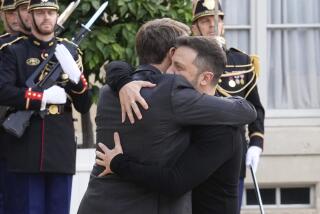Warsaw Pact Summit Ends With No New Proposals on Arms
- Share via
WARSAW — Leaders of the Warsaw Pact ended a meeting here Saturday with no new proposals for reducing conventional arms in Europe and, according a Foreign Ministry official, without discussing withdrawal of Soviet forces from Hungary.
A U.S. State Department briefing last week suggested that the Kremlin was considering the withdrawal of some or all of its 65,000 troops stationed in Hungary.
The Warsaw Pact meeting concluded a six-day visit to Poland by Soviet leader Mikhail S. Gorbachev, whose general statements encouraging socialist reform failed to evoke much hope among Poles that their own government’s limping efforts toward change would be accelerated.
The meeting was the first gathering of Warsaw Pact leaders since the summit meeting at the end of May between Gorbachev and President Reagan, and there was speculation that Gorbachev would use the occasion to announce new proposals for reductions of conventional military forces in Europe.
“There were discussions of asymmetrical force reductions in advance of further negotiations,” said Jerzy Nowak, a spokesman for the Polish Foreign Ministry. “But there were no specific proposals, and these matters must be the subject of further study by members of the alliance.”
Nowak replied “no” when asked by journalists if the Warsaw Pact leaders had discussed possible Soviet troop withdrawals from Hungary.
Polish Deputy Foreign Minister Jerzy Jaroszek also said that the leaders “did not discuss bilateral issues,” thus leaving unresolved such thorny questions as the dispute between Romania and Hungary over the treatment of the Hungarian ethnic minority in Romania.
The Foreign Ministry officials said they knew of no scheduled meetings between Hungarian leader Karoly Grosz and Romanian President Nicolae Ceausescu.
The dispute between the two countries reached a new intensity last month with a series of protest demonstrations at the Romanian embassy in Budapest. The protesters condemned Ceausescu’s plan to destroy about 7,000 Romanian villages, populated by ethnic Hungarians, in a scheme Ceausescu says will improve his nation’s agricultural output.
The Romanians responded to the state-sanctioned protest in Budapest by closing a Hungarian consulate and expelling three diplomats. In an apparent effort to cool down the dispute, Grosz proposed a meeting with Ceausescu, but the Romanians have not replied.
Jaroszek said the Communist leaders also signed a statement expressing concern over the effects of the arms race on the environment.
Nowak was asked if Gorbachev, in leading the meeting, had represented a change in style over past meetings with other Soviet leaders.
“The style is different, yes,” he said. “The language (of official communiques) is more conciliatory. The style is also different in the lack of the ceremonial approach of before, which was completely empty. He also has a somewhat joking approach, which also helps to save time.”
But while Gorbachev’s style may have refreshed some East Bloc diplomats, his trip to Poland, in the end, disappointed those Poles who had hoped that the Soviet leader would bring with him some immediate prospect of economic and political improvement here.
Gorbachev’s general endorsements of perestroika (restructuring) and repeated calls for increased socialist cooperation are an already monotonously familiar message here. Some Polish opposition figures and intellectuals had hoped that Gorbachev, in his speeches and meetings here, would give at least a subtle spur to the Polish leadership, whose long-discussed efforts at revamping the nation’s sagging economy and moribund political life have resulted so far in little more than talk.
Many Poles were also looking to Gorbachev for some gesture that would acknowledge the bitter feelings held by Poles over episodes in the often antagonistic history of the two countries. Specifically, Poles were hoping that Gorbachev would accept Soviet (or Stalinist) responsibility for the massacre of captured Polish officers in a forest near the Soviet village of Katyn in World War II. Although Gorbachev referred to the so-called “blank spots” in Polish-Soviet history, he did not mention Katyn.
Moreover, the caution with which the Polish authorities insulated Gorbachev from ordinary Poles--who are well aware of Gorbachev’s famous penchant for mixing with crowds--suggested to many that Gen. Wojciech Jaruzelski’s government, even while playing host to the architect of socialist “openness” and reform, remains as strait-laced and cautious as ever.
The tight control of the Polish authorities was evidenced at every stop on Gorbachev’s visit, including the motorcade on his arrival, where advance men waved down the limousines at prearranged stops and well-prepared welcomers were ready with copies of the Soviet leader’s book to be autographed.
The orchestration reached its peak in Krakow, where the old town square was closed for four hours before Gorbachev’s tour and packed with a “rent-a-crowd” of Polish secret policemen.
All of this was accompanied by a barrage of coverage in the Polish press and television, which seemed to increase even as public interest in the Gorbachev visit plummeted. Government spokesman Jerzy Urban on Wednesday claimed he had “never seen such enthusiastic crowds,” whereas by that time, the crowds had become, in fact, non-existent.
Indeed, Poles were staying away in such large numbers that an announcement on a popular evening television show in Warsaw told viewers that those who “still haven’t had a chance” to see Gorbachev still had the opportunity to do so at Warsaw’s main public park the following day.
At the appointed hour, police did allow people to approach the area. But, apart from curious elderly people and the usual secret policemen, no one turned out.
More to Read
Sign up for Essential California
The most important California stories and recommendations in your inbox every morning.
You may occasionally receive promotional content from the Los Angeles Times.










